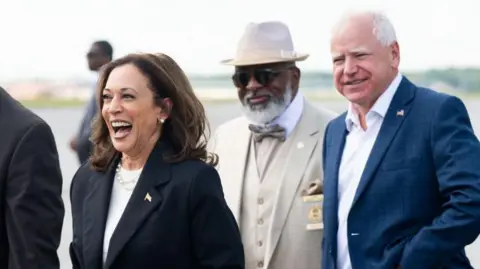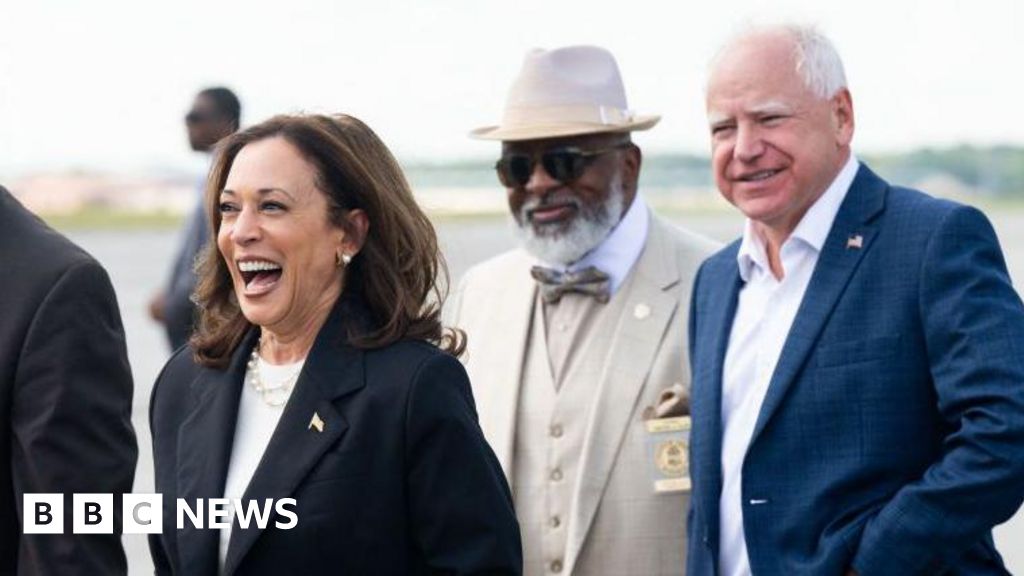US Vice-President Kamala Harris defended her shifts on policy, President Joe Biden, and her time in the White House in her first interview since becoming the Democratic nominee.
Ms Harris argued that the Biden administration was able to “recover the economy” after the pandemic and has reduced illegal border crossings in recent months.
She called the White House policies a “success”, pointing to a decline in prescription drug costs and the unemployment rate: “That’s good work. There’s more to do.”
Ms Harris appeared in the pre-recorded CNN interview with her running mate, Minnesota Governor Tim Walz. It was her first as a presidential candidate.
The most tense exchanges between Ms Harris and CNN interviewer Dana Bash centred on the assertion that the Democratic nominee’s policy positions had undergone “changes” during her time as vice-president and as a presidential candidate.
“I think the most important and most significant aspect of my policy perspective and decisions is my values have not changed,” she said when asked why her positions shifted in recent years.
Republican candidate Donald Trump had already dismissed the vice-president’s first interview, which lasted 27 minutes, because it was pre-taped and included Mr Walz.
He used a single-word in his review after it concluded.
“BORING!!!” the former president wrote on Truth Social.
Harris questioned about fracking and climate change position
Ms Harris referred to her effort to address climate change and support of the Green New Deal, a Democratic proposal to reduce reliance on fossil fuels, as something that remains a steadfast value when pressured about her shifting policy positions.
“I have always believed, and I’ve worked on it, that the climate crisis is real, that it is an urgent matter,” she said.
The vice-president pointed to the Biden administration’s work on the Inflation Reduction Act, which funnelled hundreds of billions of dollars to renewable energy and electric vehicle tax credit and rebate programs.
“We have set goals for the United States of America, and by extension the globe, around when we should meet certain standards for reduction of greenhouse gas emissions.”
Ms Harris did not explain her reversal on banning fracking – a technique for recovering gas and oil from shale rock used by an industry that is particularly strong in the battleground state of Pennsylvania.
Ms Harris had said that “there is no question I’m in favour of banning fracking” during a CNN town hall in 2019. But she has backpedalled on that view since becoming vice-president – even casting the tie-breaking vote in the Senate on new fracking leases.
In the CNN interview on Thursday, she said: “As president, I will not ban fracking.”
Brian Fallon, a campaign spokesperson, said on social media that the Biden administration’s “clean energy investments have proven the ability to make progress on climate without those past stances”.
Harris adopts Biden policies on immigration and Gaza
 Getty Images
Getty ImagesMs Harris once held more progressive immigration views as a senator and in her campaign for president in 2020. She had previously advocated for the closure of immigration detention centres and the decriminalisation of illegal crossings.
But on the subject of “securing our border” Ms Harris said “my values have not changed” and referenced her time “prosecuting transnational, criminal organisations” as California attorney general.
Earlier this year, the vice-president supported a hardline bipartisan border security deal that would have included hundreds of millions of dollars for border wall construction.
Trump pressured Republicans in Congress to kill the deal, but Ms Harris has promised to “sign it into law” if elected. She committed to passing it again during the CNN interview.
To explain her moderated immigration view, the Democratic nominee told CNN that her travels across the country as vice-president had made her “believe it is important to build consensus, and it is important to find a common place of understanding of where we can actually solve problems”.
Along those lines, Ms Harris committed to include someone “who was a Republican” in her presidential cabinet. She said it would fulfill her promise to be a president “for all Americans”.
“I have spent my career inviting diversity of opinion. I think it’s important to have people at the table when some of the most important decisions are being made that have different views.”
Ms Harris also was asked about the war in Gaza, and re-iterated the White House’s position that both Israel and Hamas must “get a deal done” and that the Palestinians deserve to have their own country neighbouring Israel.
“This war must end, and we must get a deal that is about getting the hostages out,” she said.
She would not commit to an arms embargo on Israel, as some on her party’s left flank have demanded.
Walz says “passion” led to misstatements
Mr Walz, who served for decades in the US National Guard, was asked to clarify a comment he in made in which he said he “carried” an assault rifle in “war”.
The campaign has clarified that Mr Walz was never in a war zone.
In the interview, the governor said he wore “his emotions on his sleeve” and was “speaking passionately” about the subject of gun crime in schools when he made the inaccurate statement.
That “passion” also extended to his incorrect assertion that his wife had received in-vitro fertilisation (IVF) treatments – which have become a political lightning rod in the US debate over abortion access – to conceive their children.
She received intrauterine insemination, not IVF, though doctors have said that the two fertilisation treatments are often referred to interchangeably.
Mr Walz said his record speaks for itself. He said he did not believe that Americans were “cutting hairs” between the two.
The Minnesota governor was also asked about his son, Gus, who went viral when he proudly proclaimed “That’s my dad” at the Democratic National Convention.
“It was just such a visceral, emotional moment that I’m grateful I got to experience it – and I’m so proud of him.”
Harris details Biden’s decision to drop out of race
Ms Harris described the moment that President Biden called her to share that he had decided to end his re-election bid in July.
She said her family was visiting her when she received the phone call. They had just eaten pancakes and bacon and were working on a puzzle.
“My first thought was not about me, to be honest with you, my first thought was about him,” Ms Harris said when asked whether she asked for his endorsement.
The vice-president also maintained that the president could have served again.
“He is so smart, and I have spent hours upon hours with him being in the Oval Office and in the situation room. He has the intelligence, the commitment and judgment and disposition that I think the American people rightly deserve in their president.”
She said Trump, by contrast, had none of those qualities.
The wait for Harris’s first interview as the nominee
Ms Harris has faced criticism from Republicans and some pundits for refusing to hold a press conference or an on-the-record, in-depth interview until now. Her critics argued that she was avoiding having her record challenged.
Her appearance on CNN marks her first substantive interview since Mr Biden exited race.
Ms Bash, the CNN journalist who conducted the interview of Ms Harris and Mr Walz, was one of the moderators of the 27 June debate between Mr Biden and Trump.
Mr Biden’s disastrous performance in that debate was widely seen as what sparked the effort for the president to withdraw from the race.


